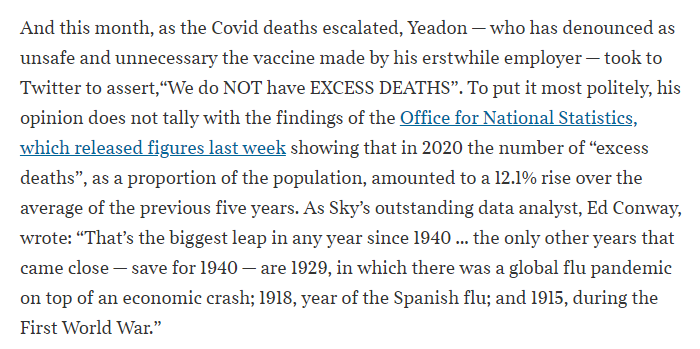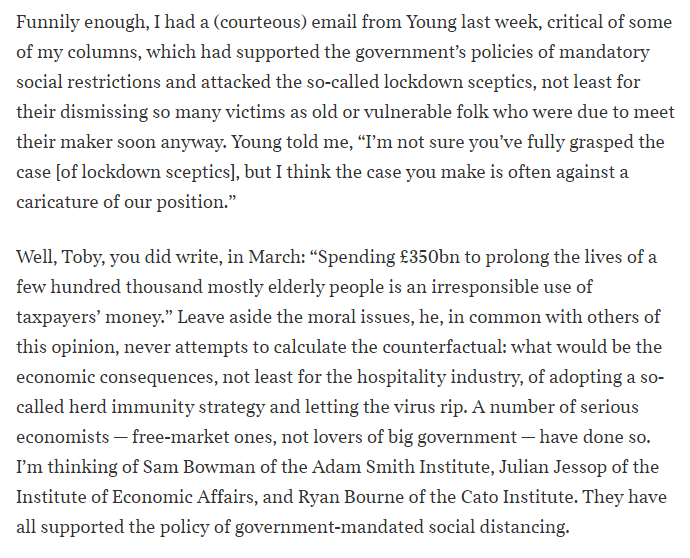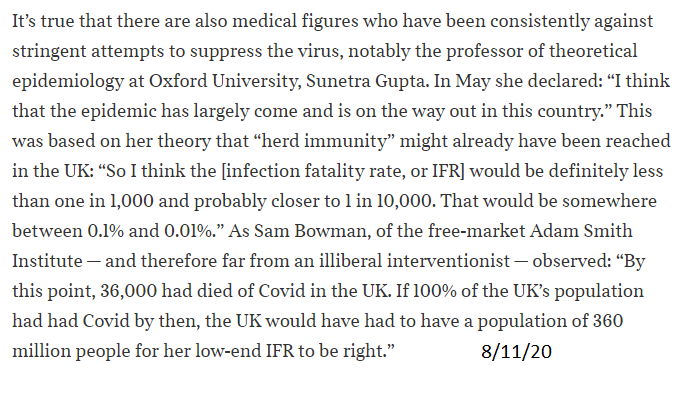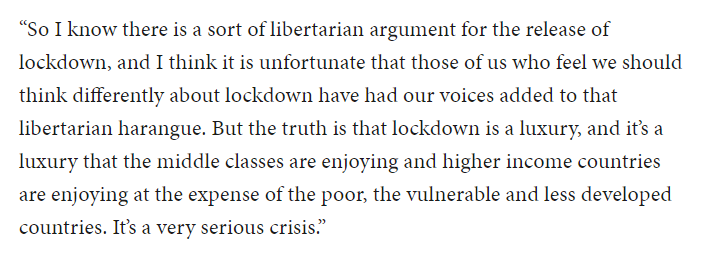No lockdown sceptic I am aware argued against precautionary measures for the categorically vulnerable.
Bad faith smears, such as this article, omits so much context, order of events and perspective, in order to turn Lockdown into a partisan issue.
Context like claims about 500K deaths, and 67 million people under house arrest for a year.
No lockdown sceptic I am aware argued against precautionary measures for the categorically vulnerable.
https://t.co/J0ZBFKxfG4

I\u2019ve called for a complete halt to PCR mass testing. Even if it was trustworthy, it serves no helpful purpose. We do NOT have EXCESS DEATHS. That\u2019s as it is in England & U.K. wide. People terrorised into staying home to die. Non-COVID excess deaths. Self-inflicted, due lockdown. https://t.co/M82gTgGpBm pic.twitter.com/c3CIfM7CZH
— Yardley Yeadon (@MichaelYeadon3) January 10, 2021

That is the reality of government policy.

That's every bit a failure as Lawson's claims against Lockdown sceptics.
"Counterfactual" not required, Dom.
In the November article, he states that Bowman is "far from an illiberal interventionist".
But illiberal interventionism is exactly what Bowman is for. If he was ever against it, he folded under the pressure.

I would like to know what she actually said back in May.
It's fair to say that Gupta's claim is more nuanced than Lawson allows.
And it's a statement in an informal interview, not in a paper offered to peers in the field, like the prediction of 500K deaths was.
https://t.co/sV7Sh7315u
“I think there’s a chance we might have done better by doing nothing at all, or at least by doing something different, which would have been to pay attention to protecting the vulnerable..."

Lawson omits all that.
More from For later read
Humans inherently like the act of solidarity. We are social beings. We like to huddle up and be together.
They used this against us.
They convinced us that it was an act of solidarity to flatten the curve, to wear a mask for others, to take the vaccines for others,
and to reach #covidzero for others. They convinced us that this was for the greater good of society.
In reality, this couldn't be further away from the truth. They have divided us and broken the core structure of our society. They have dehumanized us with their masks.
They set us against each other into clans on opposite sides of a spectrum. They have turned us into aggressive beings fighting for our survival. Some of us fear harm from the virus, others fear harm from the vaccine, and yet others fear harm from the attack on our civilization.
We are all on a flight or fight mode. We are all operating under the influence of fear. We must collect ourselves and reflect on what has happened over the last year.
How is this for the greater good of society?
They used a tactical warfare strategy against us.
'Divide and conquer'.
We fell for it.
Now we must become aware of it and fight back.
We must reunite. We must find true solidarity to save our world. To free ourselves. To regain our autonomy.
They used this against us.
They convinced us that it was an act of solidarity to flatten the curve, to wear a mask for others, to take the vaccines for others,
If there was ever a time in our lifetime to be non-partisan and for citizens of all walks of life globally to unite behind the basic fundamentals of humanity, freedoms, liberties, human rights, sovereignty, autonomy, dignity, empathy and compassion: it is now. https://t.co/Fa3ieEq51x
— Kulvinder Kaur MD (@dockaurG) January 9, 2021
and to reach #covidzero for others. They convinced us that this was for the greater good of society.
In reality, this couldn't be further away from the truth. They have divided us and broken the core structure of our society. They have dehumanized us with their masks.
They set us against each other into clans on opposite sides of a spectrum. They have turned us into aggressive beings fighting for our survival. Some of us fear harm from the virus, others fear harm from the vaccine, and yet others fear harm from the attack on our civilization.
We are all on a flight or fight mode. We are all operating under the influence of fear. We must collect ourselves and reflect on what has happened over the last year.
How is this for the greater good of society?
They used a tactical warfare strategy against us.
'Divide and conquer'.
We fell for it.
Now we must become aware of it and fight back.
We must reunite. We must find true solidarity to save our world. To free ourselves. To regain our autonomy.




















